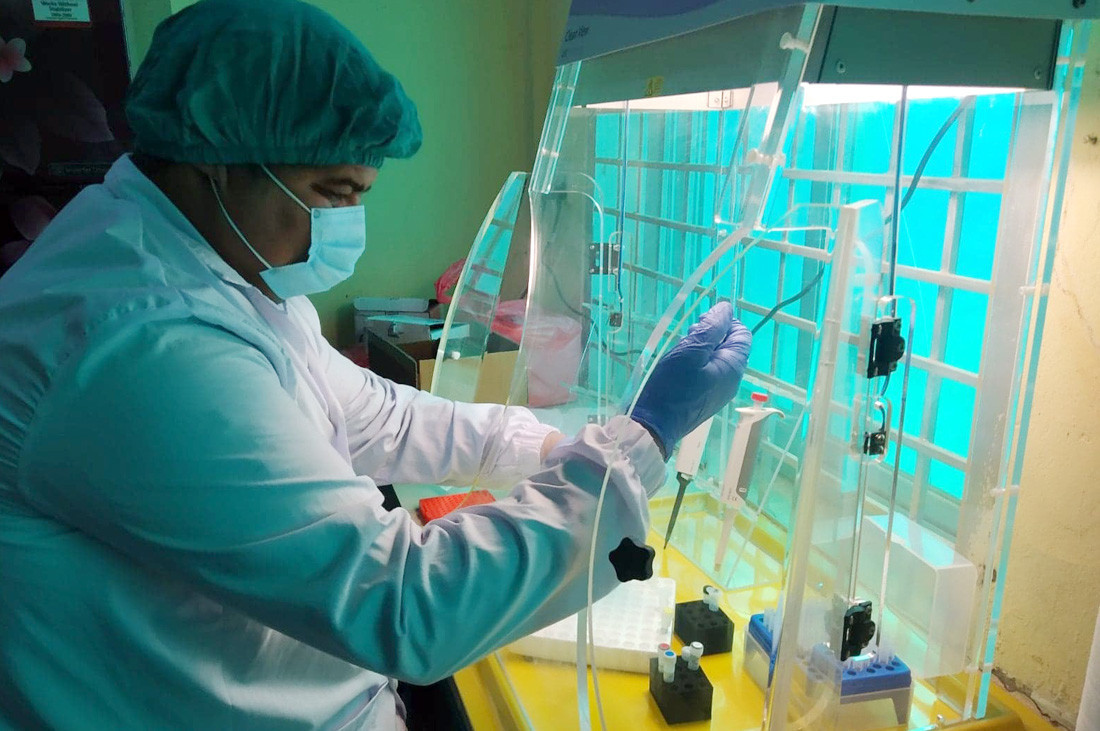Nepal’s frontline workers brave it out

Until the COVID-19 crisis hit Nepal, the phrase ‘frontline health worker’ mainly referred to the 55,000 Female Community Health Volunteers (FCHVs) who form the backbone of the country’s rural health service for vaccinations and mother-child survival.
With the pandemic, it has now come to mean doctors, staff nurses, hospital staff, counselors, health assistants, and even security personnel who are on the trenches at the frontlines enforcing rules, doing surveillance and detection, lab technicians, staffing quarantine centres, isolation wards and the medical personnel taking care of critical cases.
Frontline health workers are exposed to massive viral loads, and so far 20 health workers and 12 security personnel have tested positive for a virus that they have been fighting in the public. Returnees from abroad have gone back to their homes, and with the threat of community transmission, Nepal is falling back on its FCVHs for house-to-house surveillance and counseling.
Besides the constant risk of being infected, frontline workers have other woes: overwork, the lack of adequate personal protective equipment (PPE), extra allowance the government promised in March that has not arrived, the threat of eviction by stigmatisation by landlords has forced many to move to hotels.
Protecting those who protect us from the epidemic, Ramu Sapkota
"The workload is very heavy with 700 to 800 samples to be tested daily,” says Sanjay Chaudhary, a microbiologist at the Surkhet Provincial Hospital lab. “Some of us work in the PCR testing laboratories from six in the morning till two in the morning.”

Chaudhary says it is difficult working in full PPE with mask, gowns, gloves and visors, and they are dripping with sweat inside. He tries to drink as little water as possible because going to the bathroom is such a ordeal.
Ananda Mandal at the government lab in Dhangadi says he even wears an adult diaper so he does not have to keep going to the bathroom in his PPE. A throat and nasal swab of a patient takes up to six hours to give a result, and sometimes they need to be re-tested to confirm the result. Healthcare personnel like Mandal have to be in their PPE throughout, without drinking, eating, or going to the bathroom in the humid heat of the Tarai.
Till 7 July, Nepal had 15,964 people testing positive for coronavirus with 9,118 in isolation.
Bhutan refugee to coronavirus care-giver, Gopal Gartoula
Another 29,700 are in quarantine centres, and there have been 35 fatalities. Fortunately, there have not been big numbers of critical COVID-19 cases needing ICU treatment or ventilators. This means the frontline workers most under pressure are lab technicians.
At the COVID-19 laboratory in Bhaktapur Hospital, Nitu Adhikari says the general public has little understanding of how difficult working in a lab is. She says, “Some men wear diapers, some cut an opening in their PPEs when they have to use the bathroom and then seal it with tape afterwards. It is so difficult to get in and out of the gowns.”

All this stress and irregular eating exposes health workers to dehydration which can also lead to health problems. "When we watch the news about so many new PCR tests were done nationwide, let us give a thought to the frontline workers who put themselves at risk not just of infection but also long-term complications to carry out those tests in difficult conditions,” says health workers Radha Poudel in Jumla.
A microbiologist working in a laboratory in Province 1 has diabetes, which puts him in a high risk group for COVID-19 infection. He needs to drink lots of water, and needs to use the bathroom frequently. But for the past three months, his meals have been irregular and he suffers from dehydration.
“Even under normal circumstances, we do not work more than five hours at a stretch, and if they have to go to the bathroom, they have to change into another PPE,” says Runa Jha at the National Public Health Laboratory in Kathmandu.
Overseas Nepalis on the COVID-19 frontlines, Upasana Khadka
However, this guideline is hardly ever put into practice. Most health facilities have barely enough PPEs for healthcare personnel, let alone to change in and out of during breaks. There is also the lack of testing kits, or improper and unreliable kits that give the wrong results.
Radha Poudel says the government has not paid attention to the problems faced by healthcare personnel despite the global focus on frontline workers. As a menstrual hygiene activist even before the coronavirus pandemic, Poudel is especially concerned about female health workers who have specific problems working in hospitals and labs during their periods.
Kanchan Bista, a medical technologist at the government testing lab in Dhangadi says she wears three menstrual pads at once so she does not have to go to the bathroom to change. “It is very difficult to change and often there is no new PPE to get into afterwards,” she says.
Nitu Adhikari says the government has to ensure adequate PPEs so that lab technicians, doctors and nurses do not have to wear PPEs for long stretches. She adds: “There also have to be enough PPEs, diapers and pads for us to use. These problems need to be addressed so that those working on the frontline are comfortable and safe."
Read also: Post-pandemic mental health epidemic, Sonia Awale




